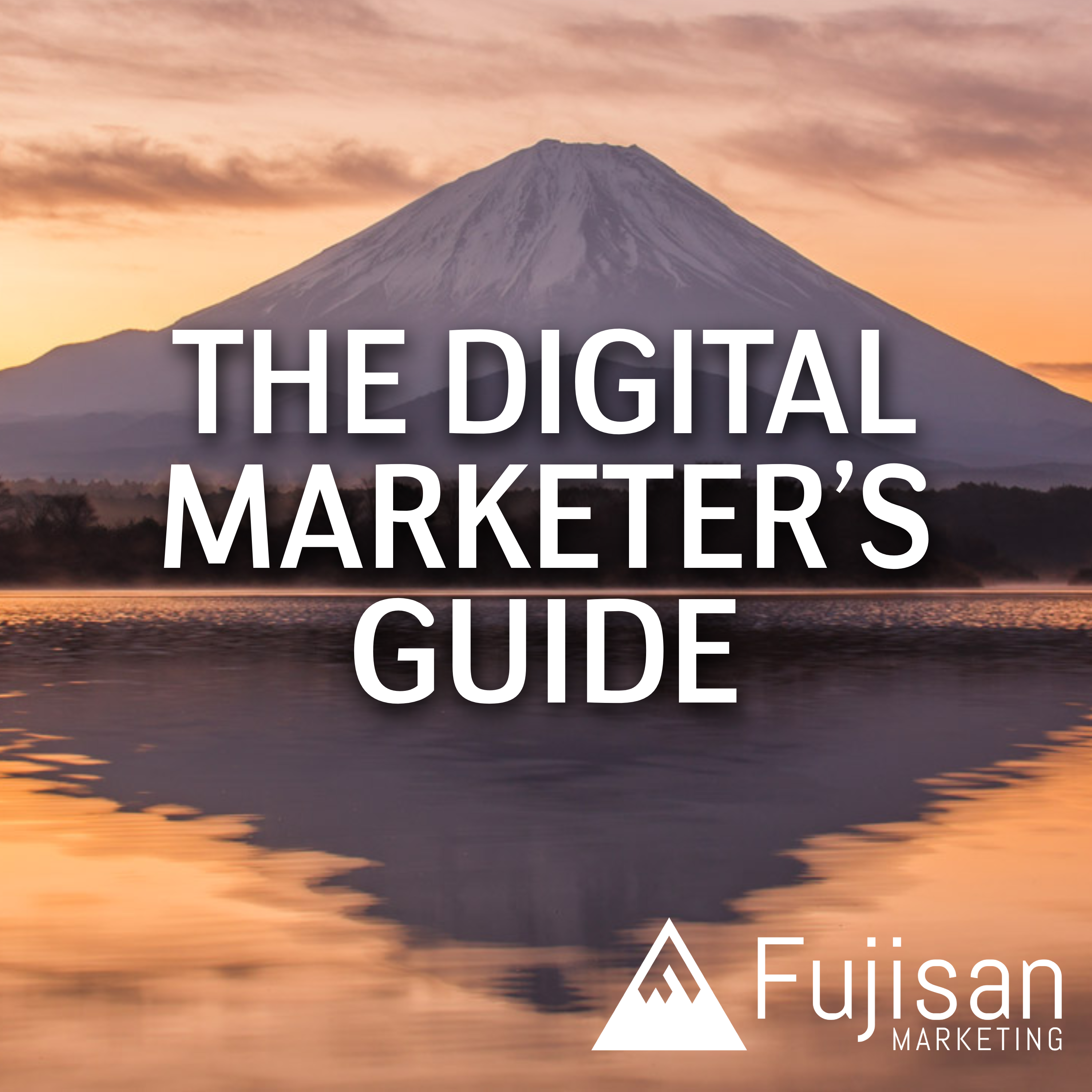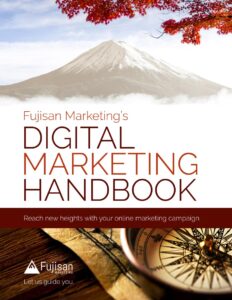Every dollar of spend matters in digital marketing! But Google and Facebook are companies that want to maximize their profits, too, so sometimes they create features that may be more amenable to their own needs rather than the needs of the advertiser. Joe Kim, founder of Frontside Consulting, shares some of the landmines, gotchas, and specifics within Google Ads and Facebook Ads to look out for.
Learn more about Fujisan Marketing here or email your questions/comments to contact@fujisanmarketing.com.
Full episode transcript:
Preston Parshall 00:14
Welcome to the digital marketers guide podcast where we break down digital marketing topics into bite sized episodes that help make your marketing program and you a little better. I’m Preston Parshall, the founder and CEO Fujisan marketing. We’re here today with Joe Kim, who owns Frontside Consulting to discuss budget landmines in Google and Facebook. Welcome to the show. Joe. Good to be here. So Joe, what do you add companies like Google and Facebook care more about advertisers or their bottom line?
Joe Kim 00:44
Okay, so this is kind of a tricky question. I have to make sure not to bite the hand that feeds me because I do spend a lot of my clients money on Google and Facebook. So let me put it this way. Google is a monopoly, right? If we’re being honest, it’s there’s only really one search engine out there. And it’s the big G. Bing, let’s be honest, it doesn’t really count. You know, I usually joke to say it’s, it’s Bing as the search engine for people that don’t know how to change their browser. So or who live in Redmond, or, or live in Redmond. Actually, I met a guy once that we used to being because he wanted to support a local business and being in Seattle, that was his shtick. So if we’re talking about organizations that are monopolies, they tend to do things that monopolies do, which, you know, they start doing things that secure their position in the market, and let’s just say, so whether that’s, you know, Rockefeller and Standard Oil, or Google or Microsoft in the 90s, you know, you can see monopolies do things that while, you know, they get their monopoly position by doing things that create a lot of value, right, so we can’t say that Microsoft didn’t do anything really, really valuable. Obviously, they brought, you know, home computing, to every one. Even Rockefeller with Standard Oil, you know, standardizing something as simple as commodity like oil and gasoline, that is something that brought immense value to the market, as is what Google did, right. So, you know, making the first like, really good search engine, you know, they, they did something of immense value. But, you know, as market cycles go, these things tend, you know, they, they want to see the growth that they saw in these phases, where they’re generating a lot of value. And, you know, as organizations get larger and larger, it’s fairly safe to say that they get less and less innovative. So, you know, they start doing things that tend to be a little bit more extractive that don’t necessarily benefit the advertiser. And so, you know,
Preston Parshall 03:20
can you give me an example?
Joe Kim 03:23
Yeah, my favorite one is the most recent shifts to performance Max campaigns. So that’s a real obvious one, you know, they basically forced all advertisers to go from shopping campaigns to smart shopping, and then said, hey, you know, that shopping campaign that you love that’s going away, you have to use performance Max now. And, as us more experienced, digital marketers know, performance Max takes quite a bit of control away from the advertiser. I have a really, really hard time believing that an organization with the resources of Google and alphabet, why you didn’t do something as simple as give us control over negative keywords. That’s kind of beyond me. So when you talk about, you know, an organization? Yeah, it’s, to me, that’s kind of a little bit obvious. That that’s a something that didn’t get built into the product that really does not benefit the advertiser. So, you know, am I going to say don’t run performance, Max? Absolutely not. You know, that’s there’s definitely a use case. For for performance Max, for sure. You know, we deploy that campaign type for many, many of our clients that we do search for, but are they you know, clipping coins and, you know, making things a little bit less than efficient for their own benefit? Yeah, I think I can see do that safely. Facebook is similar, you know, there are also a monopoly in the social media space. So there’s not really a substitute for Instagram, in that kind of pictures as social media space, you know, you do have snapchat kind of doing a little bit there. And, you know, tick tock is kind of the big one coming up. But, you know, there’s little features, you know, having run and been really, really in the Facebook ads manager over the last, what, five or five plus years, you just kind of noticed a lot of your favorite features and targeting methods, just kind of like add that disappeared, you know, little little radio buttons that, you know, expand your targeting, just kind of vaguely, those are defaulted on and difficult to turn off regularly and across all campaigns. And, you know, sometimes those features just the option to manage them just kind of disappear. And but
Preston Parshall 06:00
do you think that that is actually like, they thoughtfully did that? Or do you think that’s because some of the development of Facebook’s back end feels like it’s made with duct tape and Elmers? Glue?
Joe Kim 06:11
Yeah, that’s a good question. I mean, whether it’s malice or incompetence, I’m not really sure. But you know, either way, it’s, it’s not great for the advertiser. So yeah, it’s a bit of a mixed bag, you know, whether or not the platform has the advertisers best interest in mind in terms of generating return for them. You know, it’s it’s small, subtle ways that you can see, the platform just kind of makes it just a little bit less efficient. You know, they’re kind of, you know, cutting the product, I guess you could say.
Preston Parshall 06:48
So, what are some budget landmines people should look out for on Google?
Joe Kim 06:51
Oh, yeah. Okay. So on Google, I think one of the things to be particularly careful of is when you launch a new campaign, a lot of the default settings are going to try to give, Google wants to give itself as much credit as possible for, you know, the actions that users take on your site. So, you know, when launching a new account, or taking on a new client, one of the biggest things I always do is look through the conversions setting section of the account. So you want to make sure that the data points that you’re feeding into the bidding algorithms are going to be things that you care about. So for example, you know, if you’ve got an email acquisition kind of lead form on your site, but like you don’t do anything with it, or it’s, for some reason, it’s not valuable to your organization, you shouldn’t really be counting that as a primary conversion action, to where the bidding algorithm is going to bid up keywords or ads that generate email acquisitions, for example.
Preston Parshall 08:04
Yeah, what about Facebook?
Joe Kim 08:06
Similarly, I think one of the things that you need to make sure that you’re doing is watching that your conversion goals are all kind of driving to the appropriate metric. So if you’re an E commerce organization, and you want to, you know, drive sales, you should ideally have your campaign goals set to that metric, obviously, you know, the quality and quantity of data that you get, can affect how that performs. So, you know, kind of choose your position accordingly. You know, I think one of the main things that’s really, really important to do is just be aware of your targeting and your budgets. So if you aren’t careful about who you’re testing out as your target market, you know, Facebook is very, very happy to spend your ad budget on users that may or may not be the right market for you. So just making sure that you’re intentional about the users that you’re targeting, you know, I think is, is really, really important in making sure that your budget is spent correctly. What
Preston Parshall 09:12
has been your biggest disaster when it comes to Google or Facebook spend?
Joe Kim 09:19
Okay, so I’m gonna air out some dirty laundry here. But it’s been a little while since I’ve pulled this one off, but I was working for, you know, an E commerce retailer that had a small footwear business, I would say it’s probably only is probably less than 10% of the overall revenue and marketing spend. And I’m gonna date myself here a little bit, but we were testing a bidding optimization tool, which, you know, thought of that it’s kind of funny. It’s just all built into the platform now,
Preston Parshall 09:50
man, those guys used to make so much money. Oh, yeah. They would take a percentage of fees like 3% of $100,000 a month. I mean, that’s crazy.
Joe Kim 09:57
Yeah, just just for managing Exactly. Yeah. Yeah. Which it’s kind of wacky to think about nowadays. Yeah, it’s free in the platform now. Anyhow, we transitioned the the bid management to this new tool. And the keyword Nike shoes on broad match was, Yes, I saw that face you may present. So that keyword was in there on broad match. And, you know, the bid management tool also took the reins on budget. And so, you know, we turned hand the keys over, let the bid management do its thing. And then two days later, we were $20,000, poor on no conversions, not a single Nike shoe sold. So that’s, that’s my story of landing on a on a budget landline. So
Preston Parshall 10:59
I got one, and it’s not about us. So there’s one time I was talking to a prospect, and they had brought in a new vendor, and they brought in a vendor to compete against a current vendor, which is nuts. But this vendor decided that they were going to try and get really smart with their bidding. And this is actually within the last five years. And so they created a script to compete with it. And this, the second vendor ended up spending $50,000 over the course of two days, why they didn’t look at the campaign for two days when they had just implemented a new script. I have no idea. But yeah, I think that instantly led to them getting fired. So watch those daily budgets and watch those specialized bidding tools because they can get you in big trouble.
Joe Kim 11:48
Yeah, what note on budgets, typically, you know, with the type of campaigns that we run, they’re, they tend to be kind of evergreen. We don’t typically do a ton of kind of campaign based or campaign lifetime budgets. But I believe Facebook is doing this now as well. But they’re taking your daily budgets as a recommendation, really? And not like a hard number. Yes, Facebook doesn’t Yeah, yep. So, you know, if you’re launching a new campaign and say you set that budget to $50 a day, Google say like, Thanks for the No, but we’ll be doing our own thing. And so you’ll average over I think the course of is it 30 days, you’ll you’ll average, the daily budget that you’ve set. So that’s not as I don’t think that’s something that you can opt out of, to my last recollection. Yeah,
Preston Parshall 12:44
I wish that we could do that with our agency fees. When should you trust Google and Facebook? And which should you second guess their recommendations?
Joe Kim 12:58
Oh, man, when should you trust
Preston Parshall 13:01
Google and Facebook? And when should you second guessed the recommendations? So
Joe Kim 13:10
the recommendations that come up in your Google account, in particular, you should always second guessed all of those all the time, in my opinion, you know, a lot of what we’ve done for some of our clients is we look at those recommendations, we just basically dismiss them all. You know, it’s when you when you have a Google account rep, and I’m using air quotes, you know, gives you a call and you know, it’s kind of transparent, because, you know, often often the solution to every problem is, Hey, have you tried spending more money? Right, and so that kind of makes the, the intent of Google as a platform a little bit transparent? But yeah, generally, you know, I, you know, that’s, that’s what marketers like Preston and I are here for, take everything from a Google rep with a grain of salt. You know, fundamentally understanding how the platform’s work. I think that’s really important.
Preston Parshall 14:18
So how do you feel about Google’s optimization scores, then?
Joe Kim 14:24
I kind of treat it as a check engine lights, it’s just gonna bear it and it’s annoying. But in terms of, I mean, if you’re, if your optimization score is 100%, cool, that doesn’t mean that you’re going to be driving to your business goals necessarily. That yeah, that number means basically nothing to me. Facebook, I think you can you can trust them on the on the metrics that are native to the platform. So you know, your engagement metrics, your impression metrics, I think those are relatively trustworthy. Also, What other option do you have?
Preston Parshall 15:02
But what is engagement in Facebook? What is the engagement metric? Oh,
Joe Kim 15:06
yeah, you do have to be careful about that, you know, there’s that superscript in that eye, a little eye icon above a lot of the metrics. So make sure that you’re looking at those. You know, one of my favorite distinctions for engagement in Facebook is clicks versus link clicks. You know, as someone that doesn’t do a whole lot of like Facebook platform, native conversions, I kind of don’t care if you’re just clicking on the ad, I care if you’re coming to the site or not. So, you know, all of our internal reporting reports based off of link clicks, because, you know, you have to get to the clients website to do whatever conversion action, the client wants to happen on their site. I don’t really care too much about you know, if somebody clicks through a carousel to see the next card as a ancillary metric of engagement of like, hey, does this, you know, is my creative good, potentially, that could be useful, but, you know, I much rather look at link clicks and traffic to the client’s website, versus just some click on Facebook because, you know, the vast majority of Facebook traffic is also mobile. And, you know, we’ve all done it, we’ve fat fingered a, you know, an ad and you know, swiped through something that we didn’t intend to swipe through. So, you know, an engagement with an ad is not necessarily, you know, and some kind of metric of of intent.
Preston Parshall 16:35
Well, thanks, Joe. And thanks for listening to the digital marketers guide podcast. Be sure to subscribe to stay up to date when a new episode is released. If you have any feedback or topics you’d like to see covered, email us at contact at produce on marketing.com or learn more about us at Fujisan marketing.com. See you next time.




